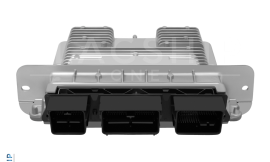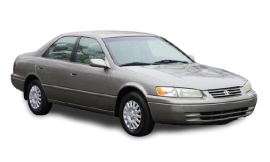Last updated on November 1st, 2024 at 11:54 am
The Role of the ECU in Your Acura Integra
The Engine Control Unit (ECU), also known as the Engine Control Module (ECM) or Powertrain Control Module (PCM), is the electronic brain of your Acura Integra. Its primary role is managing and optimizing the overall performance of your vehicle’s engine. The ECU continuously monitors various sensors in the engine and uses this information to adjust the fuel injection, ignition timing, and other key elements for optimal performance and efficiency. This not only keeps your engine running smoothly, but also ensures optimal fuel economy and reduced emissions. Trusting an industry leader like Flagship One, Inc. for your ECM needs guarantees you get an OEM control module that meets the highest standards of quality and performance, keeping your Acura Integra at its peak.

Compatibility: Ensuring the Right ECU for Your Specific Integra Model
When choosing a replacement Engine Control Module (ECM) or Powertrain Control Module (PCM) for your Acura Integra, one of the most critical aspects to consider is compatibility. Different Integra models and years may require different ECMs or PCMs, with each uniquely programmed to optimize the performance of the specific model it is designed for. Selecting an incompatible ECM or PCM could result in subpar vehicle performance, or even damage to your vehicle’s system. Thus, it is essential to ensure that the replacement unit is not just meant for an Acura Integra, but specifically tailored for your particular model and year of Integra.
Key Features: Selecting the Best ECU for Your Acura Integra
When choosing either a new or refurbished ECM or PCM for your Acura Integra, several features warrant careful consideration. Firstly, the accuracy of sensor data interpretation is paramount. The control module must be capable of analyzing and interpreting accurate data from sensors for optimum engine performance. Secondly, fuel management is a critical feature. The ECM or PCM should be able to adjust fuel injection to the finest detail, ensuring the best possible fuel economy. Thirdly, consider the ECM or PCM’s adaptability in varying conditions. It should be capable of managing the engine’s operations effectively across diverse driving conditions, whether you’re cruising down the highway or maneuvering through city traffic.
New vs. Refurbished ECM and PCM
In deciding between a new or refurbished ECM or PCM, it’s important to weigh the benefits of each. New control units offer the latest technology and minimal chances of previous wear and tear. They come with a manufacturer’s warranty, providing peace of mind concerning their longevity and performance. On the other hand, refurbished units are tested and restored to meet original performance standards, making them a cost-effective option. Flagship One, Inc. guarantees the quality of both their new and refurbished ECMs and PCMs, ensuring that your Acura Integra continues to deliver top-notch performance.
Pros and Cons of Buying a New or Refurbished ECU for Your Integra
When it comes to choosing between a new and refurbished Engine Control Module (ECM) or Powertrain Control Module (PCM) for your Acura Integra, there are several pros and cons to consider.
New ECM or PCM
Pros:
- Latest Technology: New units typically incorporate the latest technology and updates, ensuring optimum engine functionality and performance.
- Warranty: They usually come with a manufacturer’s warranty, offering peace of mind about their longevity and performance.
- No Previous Wear and Tear: Buying new means you’re getting a unit that has no history of wear or potential damage.

Cons:
- Higher Cost: New ECMs or PCMs tend to be more expensive than their refurbished counterparts.
- Availability: Sometimes, newer models may not be immediately available due to production or shipping delays.
Refurbished ECM or PCM
Pros:
- Cost-Effective: Refurbished units are typically more affordable than new ones, making them an attractive option for budget-conscious consumers.
- Tested for Quality: These units undergo rigorous testing and are restored to meet original performance standards, ensuring reliable performance.
Cons:
- Potential for Wear and Tear: While refurbished ECMs or PCMs are restored to their original standards, they may have experienced wear and tear before refurbishment.
- Limited Warranty: Refurbished units often come with a limited warranty, which might not provide the same coverage as a new unit’s warranty.
In conclusion, whether you choose a new or refurbished ECM or PCM for your Acura Integra largely depends on your budget, warranty preferences, and comfort with previous use. Rest assured, both options from Flagship One, Inc. meet the highest standards of quality and performance, ensuring your vehicle’s optimal operation.
DIAGNOSTIC TROUBLE CODES THAT RELATES TO THE PCM
Diagnostic Trouble Codes (DTCs) are codes that are stored by a vehicle’s on-board diagnostic (OBD) system when it detects a fault with the vehicle’s powertrain system.
P0100: Mass or Volume Air Flow Circuit Malfunction
P0101: Mass or Volume Air Flow Circuit Range/Performance
P0102: Mass or Volume Air Flow Circuit Low Input
P0103: Mass or Volume Air Flow Circuit High Input
P0110: Intake Air Temperature Circuit Malfunction
P0113: Intake Air Temperature Sensor 1 Circuit High
P0172: System Too Rich (Bank 1)
P0120: Throttle/Pedal Position Sensor/Switch “A” Circuit Malfunction
P0130: Oxygen Sensor Circuit Malfunction (Bank 1, Sensor 1)
P0131: Oxygen Sensor Circuit Range/Performance (Bank 1, Sensor 1)
P0132: Oxygen Sensor Circuit High Voltage (Bank 1, Sensor 1)
P0133: Oxygen Sensor Circuit Slow Response (Bank 1, Sensor 1)
P0134: Oxygen Sensor Circuit Intermittent (Bank 1, Sensor 1)
P0135: Oxygen Sensor Circuit Malfunction (Bank 1, Sensor 2)
P0136: Oxygen Sensor Circuit Range/Performance (Bank 1, Sensor 2)
P0137: Oxygen Sensor Circuit Low Voltage (Bank 1, Sensor 2)
P0138: Oxygen Sensor Circuit High Voltage (Bank 1, Sensor 2)
P0139: Oxygen Sensor Circuit Intermittent (Bank 1, Sensor 2)
P0140: Oxygen Sensor Circuit Malfunction (Bank 2, Sensor 1)
P0141: Oxygen Sensor Circuit Range/Performance (Bank 2, Sensor 1)
P0142: Oxygen Sensor Circuit Low Voltage (Bank 2, Sensor 1)
P0143: Oxygen Sensor Circuit High Voltage (Bank 2, Sensor 1)
P0144: Oxygen Sensor Circuit Intermittent (Bank 2, Sensor 1)
Here is a list of some diagnostic trouble codes (DTCs) that begin with the letter “U” and could potentially indicate a fault with the powertrain control module (PCM) in a vehicle:
U0100: Lost Communication with Engine Control Module/Powertrain Control Module
U0101: Lost Communication with Transmission Control Module
U0102: Lost Communication with Transfer Case Control Module
U0103: Lost Communication with Throttle Actuator Control Motor Circuit
U0104: Lost Communication with Throttle Actuator Control Motor Circuit Range/Performance
U0105: Lost Communication with Throttle Actuator Control Motor Circuit Low
U0106: Lost Communication with Throttle Actuator Control Motor Circuit High
U0107: Lost Communication with Throttle Actuator Control Motor Circuit Intermittent
U0108: Lost Communication with Throttle Actuator Control Motor Circuit Open
U0109: Lost Communication with Throttle Actuator Control Motor Circuit Short to Ground
U0110: Lost Communication with Throttle Actuator Control Motor Circuit Short to Battery
U0111: Lost Communication with Throttle Actuator Control Motor Circuit Short to Power
U0112: Lost Communication with Throttle Actuator Control Motor Circuit Short to Ground
U0113: Lost Communication with Throttle Actuator Control Motor Circuit Short to Battery
U0114: Lost Communication with Throttle Actuator Control Motor Circuit Short to Power
U0115: Lost Communication with Throttle Actuator Control Motor Circuit Failure
U0116: Lost Communication with Throttle Actuator Control Motor Circuit Range/Performance
Note: These codes are just a small sample and there are many other DTC codes that could potentially indicate a fault with the PCM. Additionally, the specific codes that are relevant will depend on the make and model of the vehicle. It is important to consult the vehicle’s service manual or a professional mechanic for more information about interpreting DTC codes.












